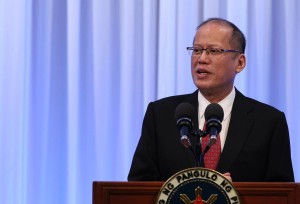Headline
Aquino blames Arroyo for prevailing poverty

President Benigno S. Aquino III delivered the keynote speech speech at the Nikkei 21st International Conference on the Future of Asia, an annual forum that discusses the opportunities and challenges facing the Asia-Pacific region. The President discussed PH-JP relations, developments in the PH, and regional concerns. The President is in Japan for a four-day state visit, on the invitation of the Japanese government. (Malacañang Photo Bureau)
MANILA, PHILIPPINES – President Benigno Aquino III blames again the detained former President Gloria Macapagal Arroyo for the prevailing poverty in the Philippines and referred her term as the “lost decade” in front of the world business leaders at the APEC CEO Summit on Monday.
“When one thinks about it, it is quite sad. If 10 years ago my predecessor had done what we’re doing now, I can only imagine where the Philippines would be,” Aquino told delegates at the Asia-Pacific Economic Cooperation Summit.
Aquino pointed out in his speech the administration’s efforts to fight corruption, the hospital arrest of Mrs. Arroyo, and the plunder charges on three opposition senators, and the impeachment of former Chief Justice Renato Corona.
“We plugged leaks throughout the bureaucracy, and we did not shy away from confronting the most complex and crippling problem of our nation, namely, corruption,” Aquino said in a report by Sandy Amanita of The Standard.
“Over the last five years, we cracked down on all those proven to have engaged in wrongdoing. Now, a former President is under hospital arrest after being charged with plunder. The former chief justice who had no compunctions about being selective about implementing the law was removed through impeachment, after it was revealed that he violated our laws by failing to declare over 98 percent of his assets as mandated by our Constitution.”
Aquino also included in his speech the 1986 EDSA People Power revolt that overturned the dictatorial regime of President Ferdinand Marcos, and placed Corazon Aquino.
“In 1986, millions of our people gathered in Edsa—our capital city’s most prominent avenue—and other cities throughout the nation to overthrow a dictator, who had for too long subjected our country to his tyranny and oppression. People armed only with rosaries, good intentions, and belief in their countrymen stood up to tanks, artillery, and planes. This was the miracle of Edsa, which made possible that which was impossible, and returned democracy through People Power. After 14 years of Martial Law, our people were successful in lifting my mother into the presidency to lead the rebuilding of our nation,” said Aquino in a report by The Standard.
Aquino also recalled the exile of his father Ninoy Aquino during the Martial Law years, and responded with a question of his own: ‘How can those who cannot even eat, think of concepts such as freedom and dignity? The first freedom is the freedom from hunger.’
His father’s words was ‘deeply personal’ and opted to tell the the business leaders about it because the APEC summit’s focus is on Inclusive Growth Imperative.
“We will have important conversations about how we can free our people from the oppression of poverty, and how to empower them to take part in sustainable economic growth. Today, perhaps I can tell you about the Philippine story: what we have done to achieve large-scale transformation,” he said.
Aside from recalling Martial Law, he also recalled his Cabinet’s meeting on the prevailing poverty rate over the last decade, which he refers as the “lost decade.”
In the past decade, according to Aquino, the numbers were alarming. Income growth became low but the inequality was incredibly in high levels, including the access to employment and social development opportunities, particularly in health, education, and social protection.
“We resolved that this sort of trickle down economics was not the way forward, and that the only real growth is that which is felt by the many. Thus, inclusive growth became the north star of our national policy—growth that truly helps each and every Filipino lift themselves up from poverty, and play a meaningful role in continuing our country’s growth story,” Aquino said.
In a recent survey conducted by the Social Weather Stations, the incident of hunger worsened to 15 percent of the population, having 3.5 million families experiencing hunger once in the last three months, which was the President’s claim about reducing the poverty rate.
Aquino added that the government turned to “bottom-up budgeting” to make the most scarce resources.
“We reached out to communities, believing that they, more than anyone else, know their own needs. We took advantage of technology to implement mechanisms to aid in transparency and accountability, through websites…. These gave our citizens greater power to monitor our budget, and also to report individuals suspected of wrongdoing,” he said.
According to Aquino, the budget for infrastructure in his administration had increased from 1.83 percent of gross domestic product in 2010 to 4.1 percent of GDP this year, and will target a 5 percent by next year.
“Indeed, our entire growth strategy hinges on the idea of empowerment. Empowered citizens, after all, are empowered consumers, whose income will go to the goods and services produced by companies. The end result: Instead of having many big fish in a very small pond, we are moving our economic ecosystem into a bigger pond, where everybody can grow and reach their full potential,” he said.
APEC secretariat said that global climate change was at the top of Aquino’s agenda during the APEC summit.
“We’re trying to get away from the cycle of a destruction brought about by typhoons and reconstruction that doesn’t change anything. We get visited by 20 typhoons a year. So, [we need to] stop the pattern of destruction-reconstruction, destruction again, reconstruction again. Let’s build back the communities better,” he added.





















